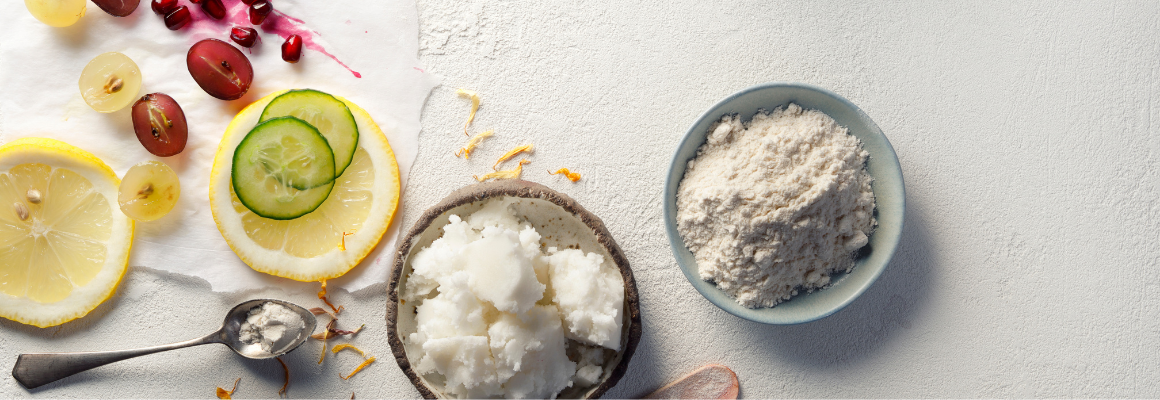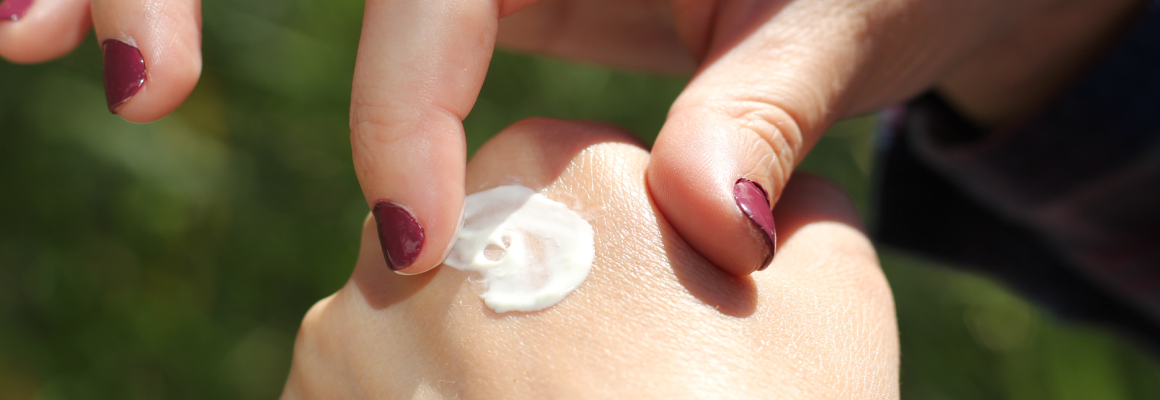If you’re dealing with sensitive skin, it can be tricky to find a safe and effective skin care product that works for your body and face without making your skin painful to touch. Unfortunately, many skincare products out there contain harsh chemicals and toxins that are not only bad for your skin, but also negatively impact the health of our planet. On the other hand, there are plenty of natural ingredients that do wonders for the skin and are even safe to use on the face. In this post, we’ll share some information on dealing with sensitive skin, highlight the importance of reading labels, and share the ingredients you should avoid, as well as the best natural ingredients for sensitive skin. Read on!
Dealing with Sensitive Skin
You try out a new product for the first time and your skin breaks out in a red rash. You wear a new brand of makeup, and your face flares up. You just bought a new top and you’re excited to try out a new fashion, but as soon as you put it on, your skin feels itchy. You work out at the gym and sweaty irritation always leaves you feeling uncomfortable. If any of these scenarios sound familiar, you’re dealing with sensitive skin.
There are a few reasons why you might have sensitive skin as the problem usually stems from another condition. This can be anything from dry skin to skin conditions like contact dermatitis, rosacea, and eczema. Having sensitive skin can make it difficult to get through the day as a bad reaction can result from contact with anything the skin deems irritating, such as soap, moisturizer, sunscreens, or make up. That’s why people with sensitive skin must be extra diligent about the products they use, especially on the face. It’s also important to carefully read labels before trying out a new product and to do a small patch test first.
The good news is that it’s possible to manage sensitive skin and keep physical symptoms under control. This can be done with a bit of extra effort on your part, as well as some changes to your skin care routine. If you’re dealing with sensitive skin, here are some simple lifestyle changes you can make to protect your body from potential irritants and feel better because of it:
- Reduce shower times. We recommend taking shorter showers that are 5-10 minutes long. We also suggest that you use lukewarm water as opposed to hot. This is because water, particularly hot water, has a tendency to dry out the skin and strip it of its natural oils.
- Pat dry your skin with a towel. Once you’re finished washing, avoid any harsh rubbing or scraping by gently pat drying your skin. This will help prevent further aggravating sensitive skin symptoms.
- Keep your skin moisturized. Applying a natural cream right after washing can help restore any lost moisture and combat the drying effects of water.
- Avoid harsh astringents and exfoliants. Again, you want to avoid any harsh rubbing as this will only further irritate the skin.
- Switch to natural products like our Coconut and Sunflower Oil Soap Bar and gentle creams
- Always do a patch test when you try out new products, especially on the face.
- Protect the skin from irritating fabrics. If you’re aware that certain fabrics or the chemicals or dyes used to make those fabrics are irritating, protect your skin by avoiding those fabrics all together or by wearing a protective layer underneath. These gentle and breathable garments from Remedywear™ are perfect for wearing underneath regular clothing during the day without any added bulk.
- Wash your clothes in a fragrance-free laundry detergent.
Eczema and the Skin
Eczema is an inflammatory skin condition that’s characterized by physical symptoms of red patches of flaky, itchy skin. Due to a damaged skin barrier that has trouble retaining moisture, people with eczema suffer from chronically dry skin which leads to intense itchiness. To relieve itchiness, eczema sufferers tend to scratch their skin which sets the vicious itch-scratch cycle in motion.
A common condition, eczema affects roughly 10-20% of the population. However, taking into account that it is such a widespread disease, there is still a lot of negative stigma and lack of awareness surrounding the condition. For example, some people still incorrectly believe that eczema is contagious or that it is the result of poor hygiene. Neither of these are true. In fact, the exact cause of eczema is unknown, but research suggests it’s linked to a combination of genetics and environmental factors. This means that eczema tends to run in families. Common external factors that can trigger an eczema flare up include pet fur, pollen, mold, smoke, the food you eat, and extreme temperatures, particularly the cool winter air.
Because people with eczema suffer from extra sensitive skin, the skin is more likely to react negatively when it comes into contact with products that contain harsh chemicals, fragrances, or toxins. Unfortunately, many of these potential triggers are common household items that your skin likely comes into contact with on a daily basis such as laundry detergents, beauty products, sunscreens, and cleaning supplies. Sensitive skin is also more likely to react negatively to irritating fabrics such as polyester, nylon, spandex and latex. In addition, an allergic reaction can result if the skin comes into contact with metals like nickel, commonly found in jewelry and accessories. The sensitive nature of eczema-prone skin makes it so important for eczema sufferers to read labels and know exactly what they are putting on their skin for their body to absorb.
Symptoms of eczema vary from person to person. They can also go through phases of varying degrees of intensity. Many people note that their sensitive skin can go through periods of intense flare ups while at other times, symptoms are hardly noticeable. Common signs of eczema include a red rash, swelling, dryness, and scaling. In severe cases, the skin may even develop small blisters that crack or ooze. With itchiness being one of the prime symptoms of eczema, many people scratch relentlessly to try to find itch relief. This can cause the skin to develop a rough, leathery texture known as lichenification. Persistent scratching can also cause the skin to crack or bleed which can pave the way for infection.
Why is my Skin Irritated?
If you have sensitive skin, it’s likely that you’ve experienced irritation at some point. This reaction can be in response to many things. Many people experience irritation because of contact with an allergen. As everybody is unique, allergens can vary from person to person. What causes a reaction in one person may not cause the same reaction in you. This is what makes it so important to know your triggers and understand how your body works. That being said, there are some common culprits that have a tendency to cause irritation. These can be skincare products or sunscreens that contain harsh ingredients or toxins, fragrances, or cheap fillers and preservatives. Other potentially irritating substances can be chemicals found in cleaning supplies and laundry detergents.
An allergic reaction to food is another potential cause for irritated skin. Again, everybody is different but some of the top triggering foods include dairy, gluten, citrus fruits (such as lemons, grapefruit, and limes), nuts, and shellfish. Soy products and different spices, such as vanilla, cloves, and cinnamon, are also known to cause reactions. If diet is irritating your skin, a reaction will usually develop within 6-24 hours of consuming the food. Bear in mind, however, that the reaction may be delayed. If you're wondering whether the food you eat may be irritating your sensitive skin, we recommend undergoing an elimination diet. As the name suggests, this involves completely cutting out the consumption of certain foods for a specific period of time (usually about a month). Then slowly incorporate these foods back into your diet and carefully monitor the results. Please speak to a doctor or dietician before undergoing an elimination diet just to be sure you are still getting all the right nutrients.
People who suffer from dry skin are also more likely to experience irritation. While dry skin itself usually isn’t a serious problem and will go away with time or under certain conditions, it can still make it difficult to get through daily life or sleep properly at night – especially because of the itchiness that usually accompanies it! There are a few reasons one might have dry skin. One factor is age. As the body naturally produces less oil as it ages, elderly people are more likely to suffer from dryness than young people. Pregnant women are also more susceptible to dry skin because of all the hormone changes. Finally, as water tends to strip the skin of its oils, those who work in a water-based career are more likely to experience dry skin and the accompanying irritation. This includes a career like catering, cooking, hairdressing, and nursing.
Harsh Chemicals and Toxins to Avoid
In the interest of your sensitive skin, here are some bad skincare ingredients you should try to avoid in your skin care routine:
- Parabens - A widely used preservative with a possible link to cancer.
- Triclosan - Harmful to the environment and can interfere with hormone function.
- Phthalates - A group of chemicals used to soften plastics, often used to make fragrances last longer.
- Fragrance or Perfume or Parfum - Unless they are essential oils, fragrances are almost all artificial.
- Siloxanes - Evidence suggests siloxanes can impair human fertility.
- PEGS - Can cause irritation and systemic toxicity.
- P-Phenylenediamine (PPD) - Known to cause allergic reactions in those with sensitive skin or who are suffering from skin conditions.
- Sodium lauryl sulphate (SLS): Sulphate can irritate the skin and make eczema worse.
You should also stay clear of any label that says drying alcohol, talcum powder, and dyes. Ingredients such as glycolic acid, salicylic acid, and retinol can also have a drying effect on the skin.
The Best Natural Products for the Skin
It’s time to swap out the harmful ingredients for healthy ingredients! Fortunately, there are also plenty of natural ingredients that can try to soothe sensitive skin and help it thrive. Boost your complexion and give your skin a natural glow with ingredients like glycerin, lanolin, and shea butter. All these gentle ingredients help draw moisture from the air to your skin providing a much-needed boost of hydration. You can find shea butter in our Coconut and Sunflower Oil Soap bar. It’s perfect for using all over the body from face to toe. Alternatively, you can use it as a hand soap throughout the day.
Gentle Oil-based Balm for the Face
Our Organic Manuka Skin Soothing Cream is our best-selling product for a reason. Made with just 6 pure and whole ingredients, it nourishes dry skin without causing further irritation. Because it’s made with Manuka honey, it contains methylglyoxal which provides both anti-bacterial and anti-inflammatory properties. Manuka oil is also more potent than tea tree oil when battling bacteria. Because honey is full of antioxidants, this oil-based cream is also anti-aging and helps prevent wrinkles. You’ll love its sweet honey smell and the fact that there’s absolutely no burning or stinging! It’s gentle enough to be used all over the body – including the face. Perfect for adults and little ones alike.
Dealing with acne? Here is our article on natural products to help deal with acne on skin.










